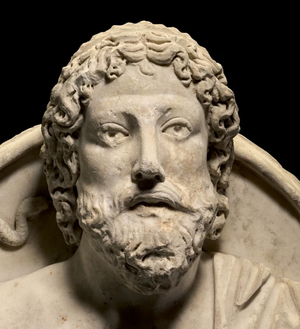Erasmios of Zilde
Erasmios of Zilde | |
|---|---|
 Bust of Erasmios | |
| Born | 16 October 759 Zilde, Syara |
| Died | 14 September 833 (aged 73) |
| Known for | Playwright, author, poet |
Erasmios of Zilde (16 October 759 - 14 September 833 CE) was a Syaran author, playwright, and poet. He is considered to one of the most significant Syaran cultural figures during the height of the Makedonian Empire. Erasmios was an exceptionally productive producer during his time; it is estimated he produced more than 50 theater productions, 150+ scripts and treatises, as well as over 40 collections of poems, although only 17 of his works survive to this day, save for scattered fragments.
Erasmios was born to a wealthy merchant family in Makedon in 759 CE. He attended a number of schools regarding writing and theater, and is believed to have derived much of his stories and plots from discussions with other merchant families his parents had connections with. By age 20 Erasmios was known across much of Syara, and his works were carried on throughout the Empire. He eventually became so well known and respected that a number of his works that were critical of the Makedonian Monarchy were allowed to be produced without repercussion, and he was a regular attendant of the Makedonian court. Many of his early plays were light hearted comedies focusing on the intricacies of Makedonian social life and customs, while his poetry and written works focused on human interaction, especially love, friendship, family relations and relatives.
The outbreak of the Burning Plague in 825 CE profoundly scarred Erasmios, whom lost his wife, two of his children, and all of his siblings to the plague. After the passing of the plague he continued to produce works much darker in narrative and tone than his previous ones, with topics revolving around death, the fragile nature of human life, and the loss of loved ones. While radically different, many of these plays and stories proved to be among his finest, with In the Company of Myself still in circulation today. Erasmios continued to produce poetry up until his final years, some of which was apocalyptic in nature and is considered to have foreshadowed the fall of the Makedonian Empire. He remains the most prominent and influential of Syaran cultural figures of late antiquity.